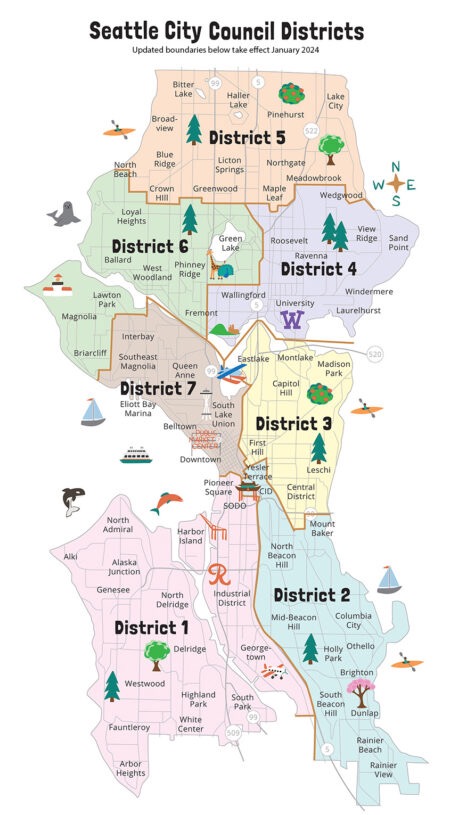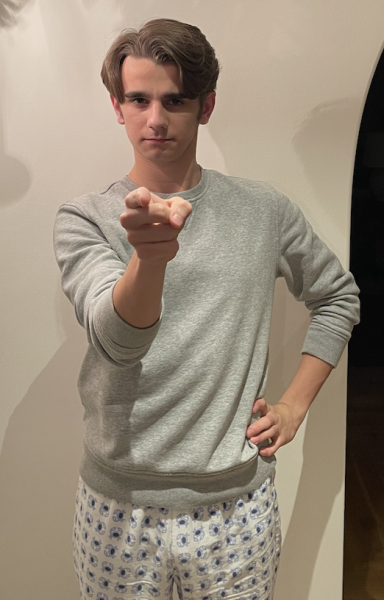America’s national politics are increasingly dominated by the perpetually incumbent. That’s why it made waves when earlier this year, four of the Seattle City Council’s nine members announced that they would not seek re-election in their districts’ upcoming elections. Additionally, three other Districts (2, 6, and 7) are in an election year. The result of all this was 45 total candidates running across seven districts for our Seattle City Council in a race that stands to introduce at least four new faces to the Council and completely reshape our City and its direction.
Not all 45 candidates will be in the general election, though. Instead, the primary election, which occurred on August 1 this year, narrows the pool to two candidates vying for each district who face off in the general election on November 7
With the primaries over and the field of 45 candidates whittled down to a mere 14, the race is beginning to heat up. The results of the August 1 primary, however, suggest that for many voters, their decision will be ultimately predicated on two issues that have taken center stage in many candidates’ platforms: public safety and homelessness.
With a crime rate that is 13.4% higher than the national average and is positioned to rise (if only marginally) this year, candidates in every district have opted for bold yet varied stances on public safety. Specifically, candidates across the board have emphasized a need to reconsider the role of police in contemporary law enforcement and best practices for drug regulation and rehabilitation.
However, within these sub-issues of policing and drugs, Seattle’s politics remain divided. On policing, some candidates like incumbent Tammy Morales of District 2 have remained steadfastly committed to ideas related to defunding the police which she claims will “prevent crime and change the community conditions that lead to violence in the first place.” Currently, Morales leads District 2 – which includes Southern portions of Seattle like the International District, Rainier Beach, and Mount Baker – over her opponent Tanya Woo by a margin of 2,000 votes. Woo, the leader of the Chinatown International District Community Watch, is a proponent of policing alternatives too but is described as less progressive than Morales.
Other candidates, nonetheless, are less adamant about policing alternatives now that opinions in their districts seem to have shifted. In District 7, for example, incumbent Andrew Lewis is retroactively walking back his earlier support for defunding the police. Instead, he’s shifted to support the Mayor’s plans to reduce public drug usage. This comes as he competes in a tight race with Bob Kettle, a retired Naval Officer and self-described “pragmatic progressive” who has vowed to increase the size of the police force and recently levied heavy blame at the Seattle City Council for an “irresponsible approach to public safety.” Lewis currently leads Kettle by a margin of 2,000 votes.
Meanwhile, Seattle Culture and History teacher Mr. Nau describes how the popular framing of drug use as an issue of public safety reflects a shifting attitude among Seattleites in how they regard drug use and its solutions. “I think some of our fellow Seattleites will see homelessness and see public displays of addiction, and they will immediately call those a public safety crisis. And sometimes they are, but sometimes they’re not – sometimes they’re public health and economic health issues,” Mr. Nau says. “Whether you see [drugs] first as a public safety issue or whether you see that first as a public health issue will dramatically steer the solutions we pursue … And there are candidates in this race representing each side of that and everything in-between.”
Most of the candidates who emerged victorious from the primary held relatively moderate views on drugs, describing the epidemic as some combination of mental health and public safety issues. Still, the topic stands to be hotly debated in the months before and even after the November general election.
The second defining issue for many voters is the housing and homelessness crisis. Interestingly enough, there was and remains significant general agreement among candidates concerning solutions to help the U.S.’s third-largest homeless population. The majority of candidates include “re-zoning” as a cornerstone of their platform, and many stress the urgency of constructing new houses and helping individuals off the streets. The primary difference between most candidates was how they prioritized these various proposed solutions.
For example, in District 5 – where Lakeside is located – the candidates disagreed on whether the most effective means of addressing homelessness lay in construction and infrastructure investments or systematic rezoning and new programs. Cathy Moore, who leads the race with 31 percent of the vote, argues that in order to protect at-risk neighborhoods like Lake City, Bitter Lake, and Northgate, Seattle should invest heavily in new construction and densifying underdeveloped areas with low-cost housing per its “Comprehensive Plan.” Moreover, she also wants more public transportation developed in District 5 to support its densification – a move that could provide Lakesiders with more transportation options. Her opponent ChrisTiana ObeySumner – who will run against her in November’s general election and only trails by 1,500 votes – agrees with the need for more construction, but she wants Seattle to more robustly incentivize inclusive zoning and to adopt a “housing first” policy for homelessness that prioritizes housing the homeless as fast as possible. Both women would be a new face on the city council if elected.
Finally, distinct among many of the candidates who performed well in the primaries is their business backgrounds. Back in District 7, Olga Sagan (owner of Piroshky Piroshky Bakery) ran a pro-small business and anti-crime campaign that garnered her 14 percent of the vote and third place in the primaries. In District 1, Maren Costa — who claims she was illegally fired from Amazon for her involvement in an environmental justice group within the company — leads a distinctly blue-collar District after the primary elections with a third of the vote. Similarly, her runner-up in District 1 is Rob Saka, who currently works as an attorney for Meta.
Though many would find the number of business leaders in this year’s elections startling, Mr. Nau explains that this degree of civic involvement from the private sector is hardly rare in Seattle: “Seattle has a really interesting relationship with its business community because it tends to be really contentiously hot and cold. There are civic leaders who are characterized, at least, as being very cozy with business, and there are others who tend to be rather combative and critical of business … and Seattle has never had what I consider a long-term equilibrium relationship between these two sides.”
Part of this, he continues, is that Seattle has historically been a “company town” where one or a handful of industries dominate the city (think Boeing in the late 20th century or major tech corporations today). The result is “a push and pull that is between ‘we want these corporations’ success to have civic benefits for our city’ and ‘we don’t want to demand so much of these corporations that they go elsewhere.’” Thus, Mr. Nau says, both sides – including prominent business leaders – involve themselves heavily in politics.
Regardless of your political persuasions, what is undeniable is that this year’s election cycle represents an exciting opportunity for Seattle to introduce at least four new faces and infinitely more ideas to their City Council. “There have been these moments of substantial turnover in bunches like this one before,” Mr. Nau concludes about the election, “but it also just doesn’t happen that often.”


